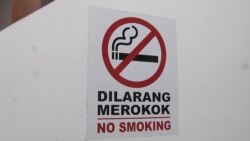At a popular Kuala Lumpur open-air food court, Eiswary Thirumalai enjoys a meal with her family. She says in the past, secondhand smoke would sometimes ruin the atmosphere. “Actually, it’s really discomfortable for us because while we are eating we smell the smoke,” she says. “So it’s not healthy for us while we are eating.”
WATCH: Enforcement of Malaysia’s Smoking Ban Sparks Controversy
A year ago, a new law prohibited smoking at all eateries in Malaysia. Previously, smoking was banned inside all air-conditioned restaurants. But the new law bans smoking within three meters of any table or chair at any indoor or outdoor eatery.
There was a one-year phase-in period in which offenders were given warnings, but since January, violators have faced fines ranging from $35 to $85. During January, more than 5,000 tickets were issued nationwide. “If they come out with this penalty, maybe it will give the person a lesson,” says Thirumalai.
Alex Lee runs a wonton stall in the same food court. Lee has been smoking for two decades, but he supports the ban. “People should have clean air while they eat, so I think it’s good that they’re enforcing this smoking ban,” he says.
It’s a point of view echoed by health advocates. “Twenty-thousand people die of smoking-related illness each year in Malaysia,” says Mandy Thoo of the National Cancer Society of Malaysia, while explaining why the society supports strict enforcement of the law. “Smoking as well as passive smoking, which is secondhand smoke, causes 15 kinds of cancer, heart disease, and it worsens diabetes as well as mental illnesses.”
The broadened smoking ban directly impacts the semi-enclosed open-air food courts that are common across Malaysia.Several eatery trade associations say some members have seen a drop in business by almost 20% since the ban started. “We request to have a small smoking zone for the convenience of the smokers,” says Chris Lee of the Malaysia Singapore Coffee Shop Proprietors General Association.
Henry Wong doesn’t smoke but says he thinks the government is overreaching. “People choose to smoke,” he says. “It’s their life, it’s their health, so I don’t really agree with banning people from smoking.”
Steven Wong, no relation to Henry Wong, openly smoked at an outdoor table at a food court one afternoon until other customers yelled at him. “A lot of people complain about secondhand smoking,” he says. "I have friends, ladies who are in their 80s who’ve been inhaling secondhand smoke for 50 years, maybe 60 years, and they’re still alive.”
The National Cancer Society of Malaysia points to studies that show secondhand smoke is very unhealthy. “For nonsmokers who are exposed to secondhand smoke in homes as well as offices, they increase their risk of smoking-related diseases by 20 to 30 percent,” says the society’s Mandy Thoo. “So it may be your choice to smoke but it’s not someone else’s choice to be exposed to secondhand smoke.”









